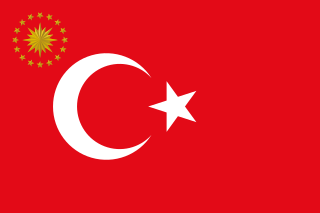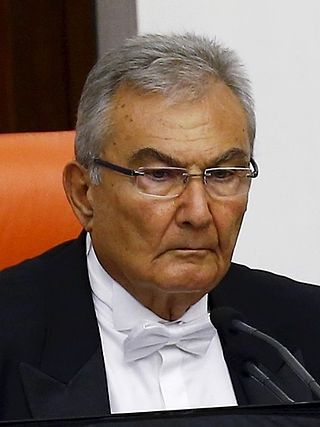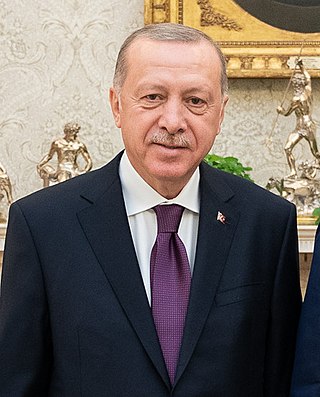A coalition government, or coalition cabinet, is a government by political parties that enter into a power-sharing arrangement of the executive. Coalition governments usually occur when no single party has achieved an absolute majority after an election. A party not having majority is common under proportional representation, but not in nations with majoritarian electoral systems.

The president of Turkey, officially the president of the Republic of Türkiye, is the head of state and head of government of Turkey. The president directs the executive branch of the national government and is the commander-in-chief of the Turkish military. The president also heads the National Security Council.

Sami Süleyman Gündoğdu Demirel was a Turkish politician, engineer, and statesman who served as the 9th President of Turkey from 1993 to 2000. He previously served as the Prime Minister of Turkey seven times between the years 1965 and 1993. He was the leader of the Justice Party (AP) from 1964 to 1980 and the leader of the True Path Party (DYP) from 1987 to 1993.

The Justice and Development Party, abbreviated officially as AK Party in English, is a political party in Turkey self-describing as conservative-democratic. It has been the ruling party of Turkey since 2002. Third-party sources often refer to the party as national conservative, social conservative, right-wing populist and as espousing neo-Ottomanism. The party is generally regarded as being right-wing on the political spectrum, although some sources have described it as far-right since 2011. It is one of the two major parties of contemporary Turkey along with the Republican People's Party (CHP).

The Republican People's Party is a Kemalist and social democratic political party in Turkey. It is the oldest political party in Turkey, founded by Mustafa Kemal Atatürk, the first president and founder of the modern Turkish Republic. The party is also cited as the founding party of modern Turkey. Its logo consists of the Six Arrows, which represent the foundational principles of Kemalism: republicanism, reformism, laicism (Laïcité/Secularism), populism, nationalism, and statism. It is currently the second largest party in Grand National Assembly with 127 MPs, behind the ruling conservative Justice and Development Party.

The prime minister of Turkey, officially the prime minister of the Republic of Turkey, was the head of government of the Republic of Turkey from 1920 to 2018, who led a political coalition in the Turkish Parliament and presided over the cabinet. Throughout the political history of Turkey, functions and powers of the post have changed occasionally. Prior to its dissolution as a result of the 2017 Constitutional Referendum, the holder of the premiership was generally the dominant figure in Turkish politics, outweighing the president.
A grand coalition is an arrangement in a multi-party parliamentary system in which the two largest political parties of opposing political ideologies unite in a coalition government.

The Grand National Assembly of Turkey, usually referred to simply as the TBMM or Parliament, is the unicameral Turkish legislature. It is the sole body given the legislative prerogatives by the Turkish Constitution. It was founded in Ankara on 23 April 1920 amid the National Campaign. This constitution had founded its pre-government known as 1st Executive Ministers of Turkey in May 1920. The parliament was fundamental in the efforts of Mareşal Mustafa Kemal Atatürk, 1st President of the Republic of Turkey, and his colleagues to found a new state out of the remnants of the Ottoman Empire.

The Republican Turkish Party is a social-democratic political party in Northern Cyprus. The party was founded in 1970 by Ahmet Mithat Berberoğlu, a lawyer, in opposition to the leadership of Fazıl Küçük and Rauf Denktaş.

Deniz Baykal was a Turkish politician. A member of the Republican People's Party (CHP) who served as Deputy Prime Minister and Minister of Foreign Affairs from 1995 to 1996. Having served in numerous government positions, Baykal led the CHP from 1992 to February 1995, from September 1995 to 1999 and again from 2000 to 2010. Between 2002 and 2010, he also served as the Leader of the Opposition by virtue of leading the second largest party in the Parliament.

The Democrat Party was a centre-right political party in Turkey, and the country's third legal opposition party, after the Liberal Republican Party established by Ali Fethi Okyar in 1930, and the National Development Party established by Nuri Demirağ in 1945. Founded and led by Celâl Bayar and Adnan Menderes, it was the first of the opposition parties to rise to power, de-seating the Republican People's Party during the national elections of 1950 and ending Turkey's one party era. The party ″facilitated the resurgence of Islam, especially at the popular level, in Turkey″.

The Leader of the Opposition in South Africa is the leader of the largest political party in the National Assembly that is not in government. The House of Assembly was the most important House from 1910 to 1994 and the National Assembly from 1994. The leader of the opposition acts as the public face of the opposition, leading the Official Opposition Shadow Cabinet and the challenge to the government on the floor of Parliament. They thus act as a chief critic of the government and ultimately attempt to portray the opposition as a feasible alternate government.

The leader of the Official Opposition, formally known as the leader of His Majesty's Loyal Opposition, is the member of the Legislative Assembly (MLA) who leads the Official Opposition, typically the second largest party in the provincial legislature.

The Liberal Republican Party was a political party founded by Fethi Okyar upon President Kemal Atatürk's request in the early years of the Turkish republic.

The True Path Party was a centre-right political party in Turkey, active from 1983 to 2007. For most of its history, the party's central figure was Süleyman Demirel, a former Prime Minister of Turkey who previously led the Justice Party (AP) before it was shut down in the aftermath of the 1980 military coup. The DYP was widely considered the successor of both the AP and the Democrat Party (DP), active in Turkey's early multi-party period.

The Turkish order of precedence, the following is the list of Turkish order of precedence approved by the President of Turkey and administered by the Directorate of Protocols of the Ministry of Foreign Affairs.
The 11th Grand National Assembly of Turkey existed from 27 October 1957 to 27 May 1960. There were 610 MPs in the parliament. While The Democrat Party (DP) won a vast majority, the opposition was represented by the Republican People's Party (CHP) with 173 seats, the Republican Nation Party (CMP) and Liberty Party (HP) each with 4 seats and 2 Independents.

Abdurrahman Mustafa is a Syrian Turkmen politician who is the incumbent president of the Syrian Turkmen Assembly, the umbrella organization of the Turkmen political movements in Syria, and the political leader of the Turkmen national movement of Syria. On 6 May 2018, he was elected as the head of the Syrian National Coalition.

The Good Party is a nationalist and Kemalist political party in Turkey, established on 25 October 2017 by Meral Akşener. The party's name and flag is a reference to the tamga of the Kayı tribe.




































